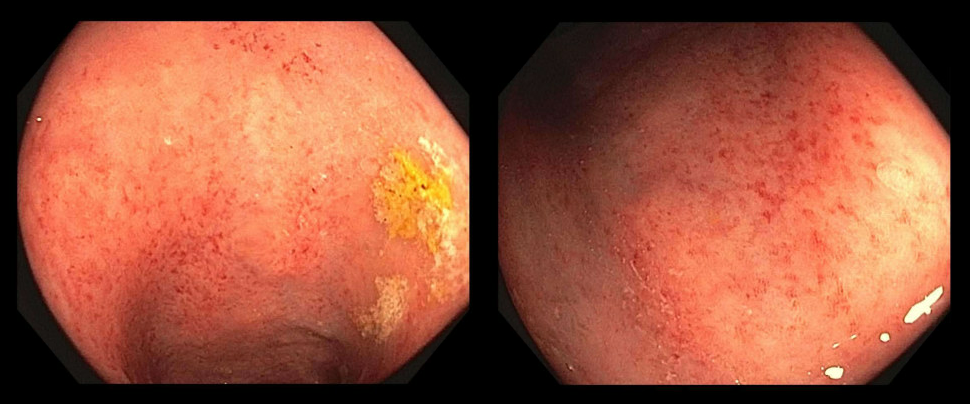Tuesday Poster Session
Category: Colon
P4639 - Proctitis as an Unusual Presentation of Mast Cell Activation Syndrome
Tuesday, October 28, 2025
10:30 AM - 4:00 PM PDT
Location: Exhibit Hall

Obada Daaboul, MD
Southern Illinois University
Springfield, IL
Presenting Author(s)
Obada Daaboul, MD, Muhammed Yaman Swied, MBBS, Muaataz Azzawi, MD, Abdul Swied, MD
Southern Illinois University, Springfield, IL
Introduction: Mast cell activation syndrome (MCAS) is a condition characterized by the excessive activation of mast cells, leading to the release of mediators such as histamine, tryptase, and prostaglandins. MCAS typically affects at least two systems, including dermatologic (flushing, urticaria, pruritus), gastrointestinal (abdominal pain, diarrhea, nausea), cardiovascular (hypotension, tachycardia, syncope), and respiratory (wheezing, dyspnea). We present an interesting case of MCAS with an unusual presentation of proctitis on endoscopy, where symptoms resolved with antihistamine therapy.
Case Description/
Methods: A 52-year-old woman with a history of multiple episodes of anaphylaxis of unclear etiology presented to the clinic for evaluation of abdominal pain and diarrhea that had persisted for one year. Abdominal computed tomography revealed scattered colonic diverticula, but otherwise showed no abnormalities. A colonoscopy was performed to evaluate her symptoms, revealing erythema and loss of vascularity in a continuous and circumferential pattern from the anus to the rectum, consistent with proctitis. The rest of the colon appeared normal. Multiple biopsies were taken from the colon and the proctitis area. Pathology revealed a focal increase in mast cells in the lamina propria, with up to 40 mast cells per high-power field (HPF) detected by CD117 immunostaining. Due to concerns for MCAS in the context of unexplained anaphylaxis and colonoscopy findings, the patient was started on famotidine to assess therapeutic response. At a two-month follow-up, she reported complete resolution of diarrhea and abdominal pain.
Discussion: Diagnosing MCAS requires meeting three criteria: symptoms of mast cell activation, objective evidence of increased mast cell mediators during episodes, and a response to treatment with anti-mediator therapy. In our case, the patient met two criteria, and normal tryptase levels were likely due to sampling timing outside the anaphylactic episode. Management includes avoiding triggers and using medications like antihistamines. Our patient responded well to an antihistamine, supporting the MCAS diagnosis. Colonoscopy findings in MCAS are typically nonspecific, with proctitis being a rare presentation. Our case highlights the importance of considering mast cell disorders like MCAS in patients with a history of anaphylaxis presenting with diarrhea and abdominal pain.

Figure: Endoscopic images of the rectum demonstrating proctitis with continuous inflammation extending from the anus to the rectum
Disclosures:
Obada Daaboul indicated no relevant financial relationships.
Muhammed Yaman Swied indicated no relevant financial relationships.
Muaataz Azzawi indicated no relevant financial relationships.
Abdul Swied indicated no relevant financial relationships.
Obada Daaboul, MD, Muhammed Yaman Swied, MBBS, Muaataz Azzawi, MD, Abdul Swied, MD. P4639 - Proctitis as an Unusual Presentation of Mast Cell Activation Syndrome, ACG 2025 Annual Scientific Meeting Abstracts. Phoenix, AZ: American College of Gastroenterology.
Southern Illinois University, Springfield, IL
Introduction: Mast cell activation syndrome (MCAS) is a condition characterized by the excessive activation of mast cells, leading to the release of mediators such as histamine, tryptase, and prostaglandins. MCAS typically affects at least two systems, including dermatologic (flushing, urticaria, pruritus), gastrointestinal (abdominal pain, diarrhea, nausea), cardiovascular (hypotension, tachycardia, syncope), and respiratory (wheezing, dyspnea). We present an interesting case of MCAS with an unusual presentation of proctitis on endoscopy, where symptoms resolved with antihistamine therapy.
Case Description/
Methods: A 52-year-old woman with a history of multiple episodes of anaphylaxis of unclear etiology presented to the clinic for evaluation of abdominal pain and diarrhea that had persisted for one year. Abdominal computed tomography revealed scattered colonic diverticula, but otherwise showed no abnormalities. A colonoscopy was performed to evaluate her symptoms, revealing erythema and loss of vascularity in a continuous and circumferential pattern from the anus to the rectum, consistent with proctitis. The rest of the colon appeared normal. Multiple biopsies were taken from the colon and the proctitis area. Pathology revealed a focal increase in mast cells in the lamina propria, with up to 40 mast cells per high-power field (HPF) detected by CD117 immunostaining. Due to concerns for MCAS in the context of unexplained anaphylaxis and colonoscopy findings, the patient was started on famotidine to assess therapeutic response. At a two-month follow-up, she reported complete resolution of diarrhea and abdominal pain.
Discussion: Diagnosing MCAS requires meeting three criteria: symptoms of mast cell activation, objective evidence of increased mast cell mediators during episodes, and a response to treatment with anti-mediator therapy. In our case, the patient met two criteria, and normal tryptase levels were likely due to sampling timing outside the anaphylactic episode. Management includes avoiding triggers and using medications like antihistamines. Our patient responded well to an antihistamine, supporting the MCAS diagnosis. Colonoscopy findings in MCAS are typically nonspecific, with proctitis being a rare presentation. Our case highlights the importance of considering mast cell disorders like MCAS in patients with a history of anaphylaxis presenting with diarrhea and abdominal pain.

Figure: Endoscopic images of the rectum demonstrating proctitis with continuous inflammation extending from the anus to the rectum
Disclosures:
Obada Daaboul indicated no relevant financial relationships.
Muhammed Yaman Swied indicated no relevant financial relationships.
Muaataz Azzawi indicated no relevant financial relationships.
Abdul Swied indicated no relevant financial relationships.
Obada Daaboul, MD, Muhammed Yaman Swied, MBBS, Muaataz Azzawi, MD, Abdul Swied, MD. P4639 - Proctitis as an Unusual Presentation of Mast Cell Activation Syndrome, ACG 2025 Annual Scientific Meeting Abstracts. Phoenix, AZ: American College of Gastroenterology.
